Most Americans are following the election closely, though roughly half say it’s hard to know what’s true
Pew Research Center conducted this study to better understand how U.S. adults get news and information about the 2024 presidential election.
The survey of 9,680 U.S. adults was conducted from Sept. 16 to 22, 2024. Everyone who completed the survey is a member of the Center’s American Trends Panel (ATP), a group of people recruited through national, random sampling of residential addresses who have agreed to take surveys regularly. This kind of recruitment gives nearly all U.S. adults a chance of selection. Surveys were conducted either online or by telephone with a live interviewer. The survey is weighted to be representative of the U.S. adult population by gender, race, ethnicity, partisan affiliation, education and other factors. Read more about the ATP’s methodology.
Here are the questions used for this report, the topline and the survey methodology.
Pew Research Center is a subsidiary of The Pew Charitable Trusts, its primary funder. This is the latest report in Pew Research Center’s ongoing investigation of the state of news, information and journalism in the digital age, a research program funded by The Pew Charitable Trusts, with generous support from the John S. and James L. Knight Foundation.
As Americans navigate the abundance of information about the 2024 U.S. presidential election, many of them are seeing news they think is inaccurate – and having a hard time distinguishing fact from fiction.
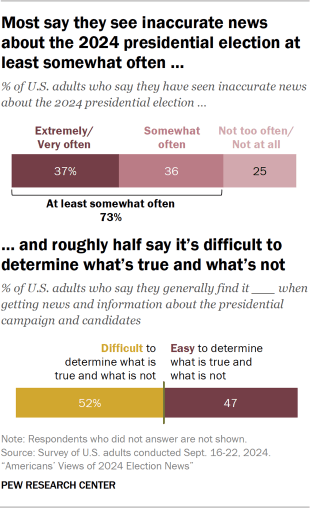
A new Pew Research Center survey finds that about three-quarters of U.S. adults (73%) say they have seen inaccurate news coverage about the election at least somewhat often, including 37% who have seen this kind of information extremely or very often.
About half of Americans (52%) say they generally find it difficult to determine what is true and what is not when getting news about the election. And 28% separately say that it’s been difficult for them to find reliable information about the presidential election.
Supporters of the two major political parties are having vastly different experiences with election news in these ways.
- Republicans (including independents who lean toward the GOP) are much more likely than Democrats and Democratic leaners to say they have seen inaccurate coverage and that they are having a hard time sorting out the truth.
- And Republicans are less likely than Democrats to say it is easy for them to find reliable information about the election (29% vs. 52%, respectively).
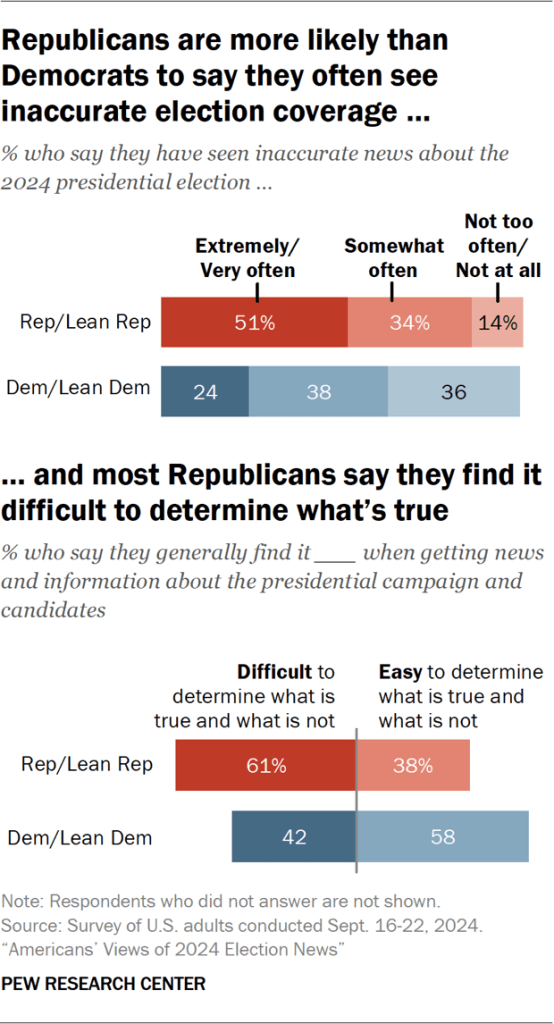
Overall, Americans are much less likely to be wary of the information from their most frequent sources of election news. Much smaller shares say they at least sometimes see inaccurate information from the sources they turn to most often for news and information about the election than say the same about election news in general.
At the same time, people also say inaccurate information is coming from sources other than news outlets: 58% of Americans say they have heard people they know share information about the election that they think is inaccurate at least somewhat often. There is little difference between the parties on this question – Republicans and Democrats say they hear inaccurate information from their personal circles at roughly the same rates.
Jump to more information about Americans’ views on the accuracy of election news.
How Americans’ attention toward election news has changed throughout the campaign
Overall, about seven-in-ten Americans say they are following news about the candidates for the 2024 presidential election very (28%) or fairly (40%) closely. This is up from 58% in April and 65% in July, mirroring a pattern also seen in 2020 in which attention increases closer to Election Day.
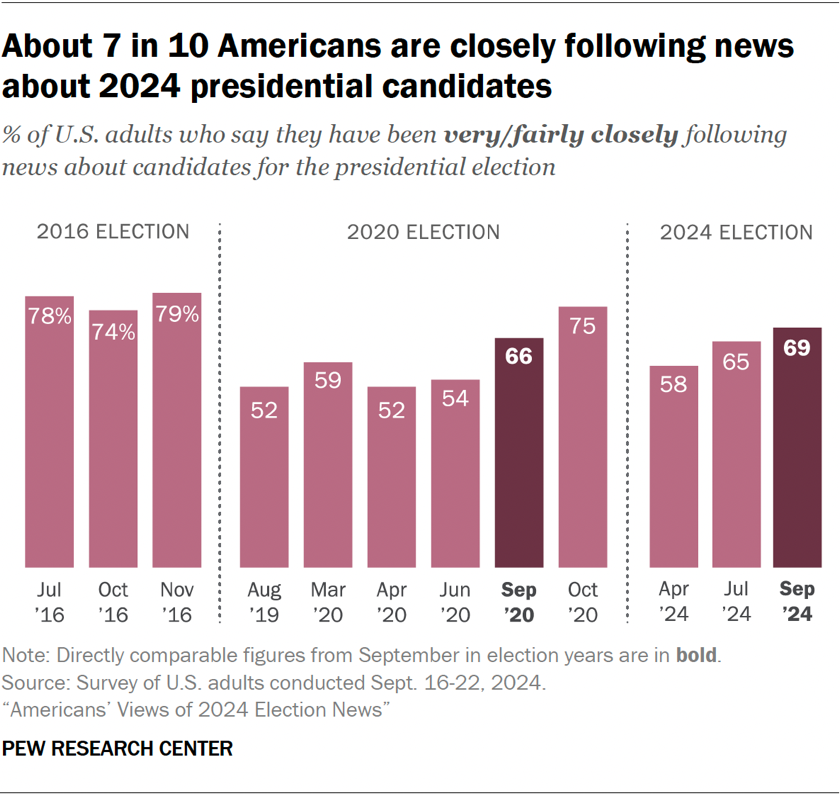
Between April and September of this year, the increase was driven particularly by Democrats, who were slightly less likely than Republicans to be following election news closely in the two earlier surveys. Now, there is no difference between the two parties in their levels of attention.
About six-in-ten Americans say they are worn out by so much coverage of the campaign, while nearly four-in-ten say they like seeing a lot of coverage. These shares are similar to those measured in April, as well as in surveys conducted in 2020 and 2016.
Jump to more about how much attention Americans are paying to election news.
What kinds of news about the election are Americans seeing – and what do they want to see?
The survey asked Americans how much they have heard about several specific election-related topics that have been in the news in recent months.
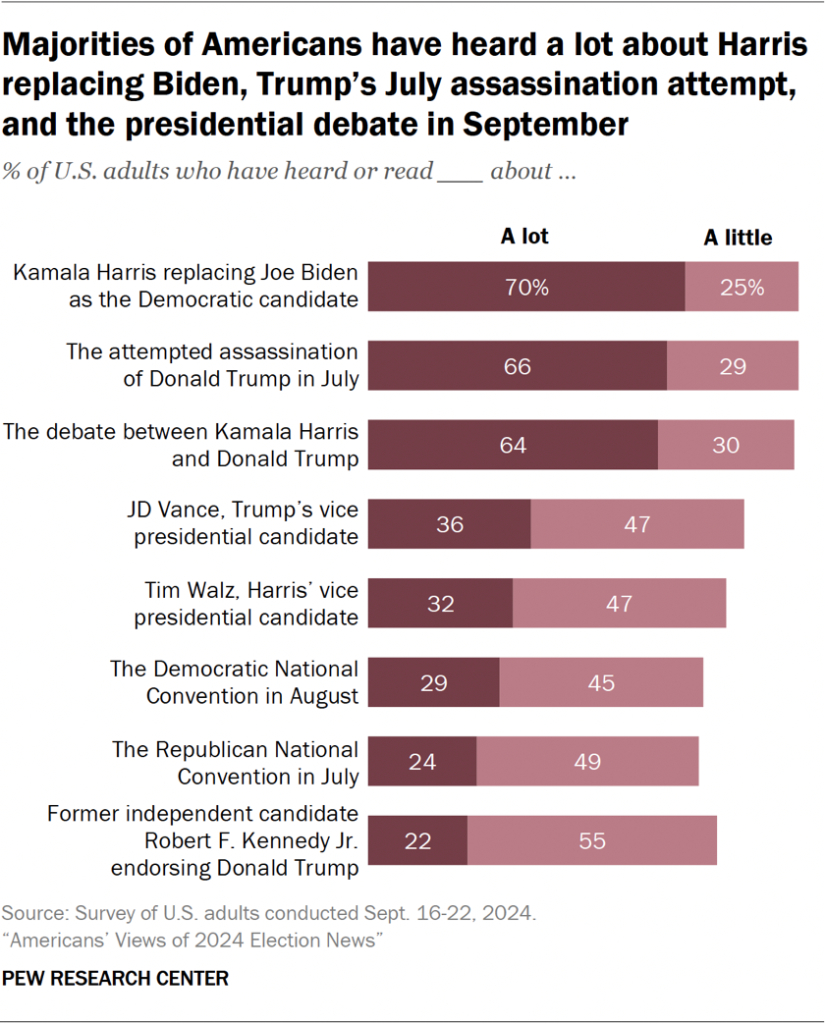
We found that most people say they have heard or read a lot about Vice President Kamala Harris replacing President Joe Biden as the Democratic nominee (70%), the first assassination attempt on former President Donald Trump in July (66%), and the debate between Harris and Trump on Sept. 10 (64%). (The survey questions were finalized before the second assassination attempt on Trump in September.)
Smaller shares say they have heard a lot about the vice presidential candidates, the two parties’ national conventions, and third-party candidate Robert F. Kennedy Jr. endorsing Trump when he dropped out of the race. Still, large majorities of Americans say they have heard at least a little about each of these topics.
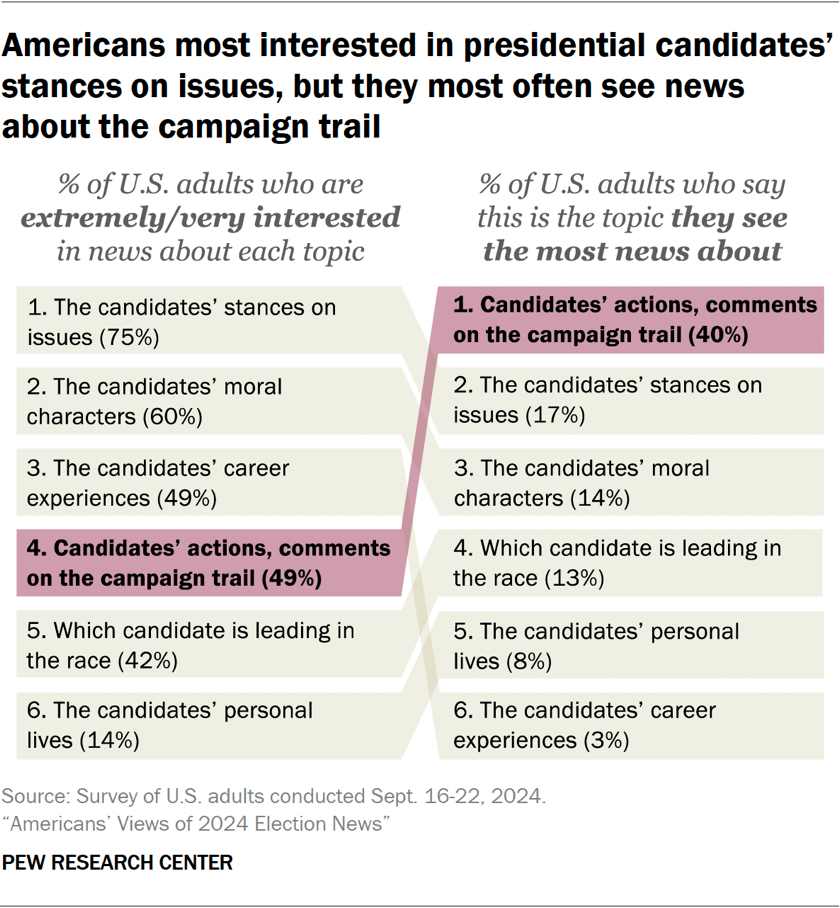
More generally, news about the candidates’ comments and actions on the campaign trail appears to be the most common type of coverage people are seeing. Four-in-ten U.S. adults say this is the type of election news they see most, outpacing information about the candidates’ stances on issues (17%), their moral characters (14%) or which candidate is leading the race (13%).
This does not align with what Americans are most interested in. For example, higher shares say they are extremely or very interested in news about candidates’ stances on the issues (75%) and their moral characters (60%) than say the same about candidates’ comments and actions during the campaign (49%).
About half of Americans (49%) say they are extremely or very interested in the candidates’ career experiences, while just 3% say this is the topic they see the most news about.
Jump to more information about what election news topics Americans are seeing.
Age differences in primary platforms used for election news
Americans get news about politics and the election in a wide variety of ways. No single platform dominates: About a third of U.S. adults (35%) say TV is their most common source of election news, while roughly one-in-five each say the same about news websites or apps (21%) and social media (20%). Smaller shares primarily use other platforms, including search engines, podcasts, radio or print publications.
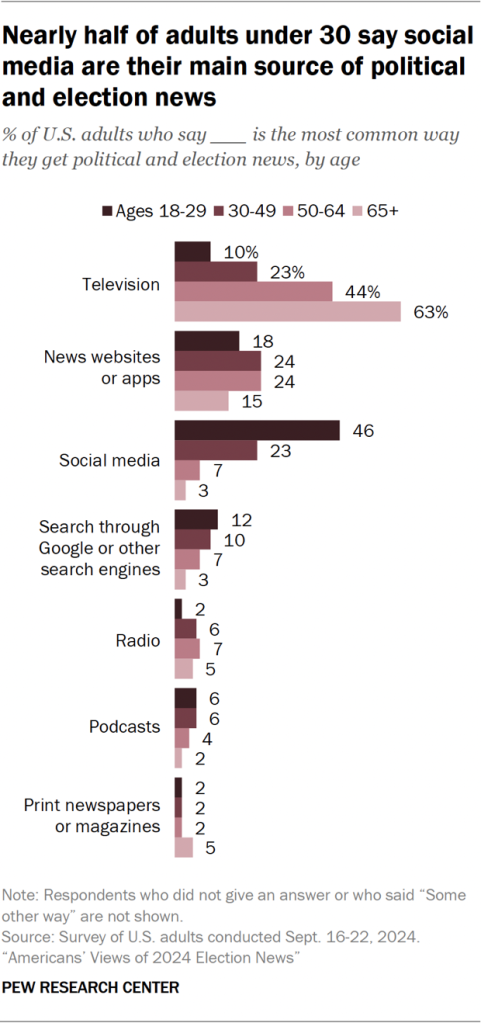
Younger and older Americans are getting election news in very different ways. Nearly half of U.S. adults under 30 (46%) say that social media are their most common source of election news, while others in this age category turn to different digital sources like news websites or apps (18%), search engines (12%) or podcasts (6%). One-in-ten say TV is their most common source of election news.
But among U.S. adults ages 65 and older, a majority (63%) say TV is their top source. The same is true for 44% of those ages 50 to 64.
The survey also asked about several specific news outlets as sources of political and election news; there was little change on these questions since 2020. About two-thirds of Americans say national TV networks (ABC, CBS and NBC) are at least a minor source of political and election news for them, including three-in-ten who cite this as a major source. CNN and Fox News are each sources of election news for about half of Americans, with about two-in-ten naming each cable news network as a major source.
Smaller shares cite other outlets as major or minor sources of election news, including MSNBC, The New York Times, NPR, The Washington Post and conservative talk radio.
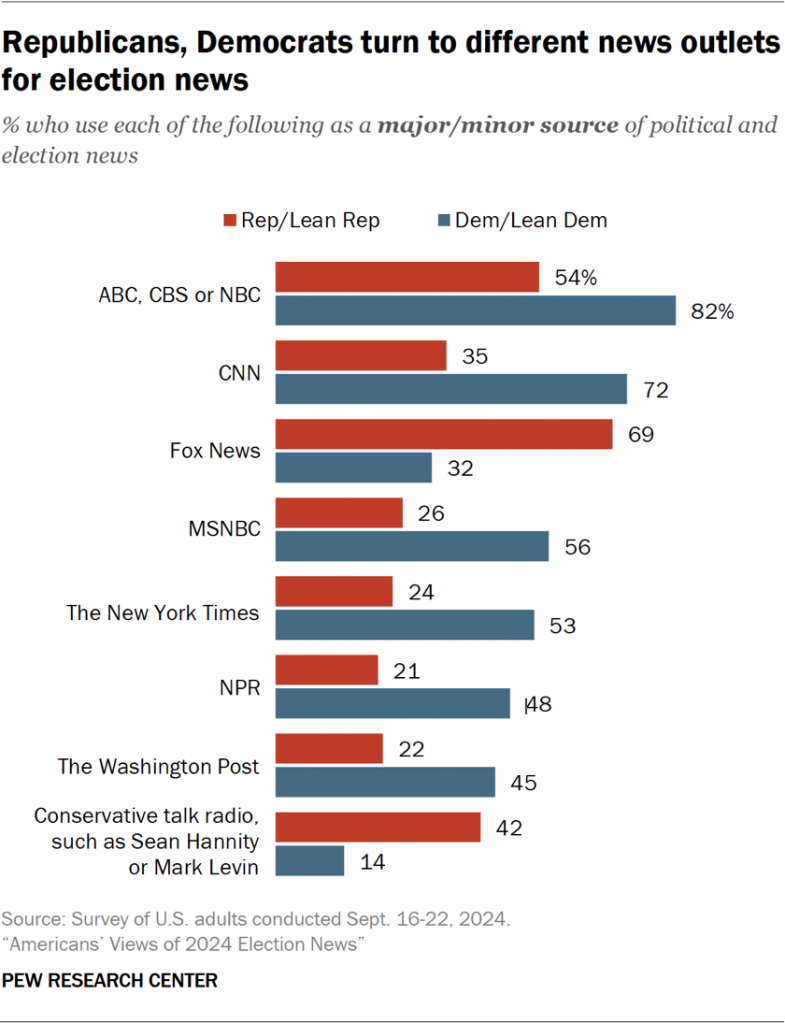
While Democrats and Republicans largely give similar answers about what platforms they use most often for election news (e.g., TV, social media, etc.), there are huge differences between the two parties on several of these specific outlets.
Republicans are much more likely than Democrats to say Fox News and talk radio are at least minor sources of election news for them. But Democrats are far more likely than Republicans to get election news from all of the other news outlets mentioned in the survey. For instance, about twice as many Democrats (72%) as Republicans (35%) say CNN is at least a minor source of political and election news for them.
Jump to more on Americans’ sources of election news.
Ratings of the news media’s election coverage differ by party
There also are huge partisan differences in opinions on how well the news media have done covering the 2024 presidential election.
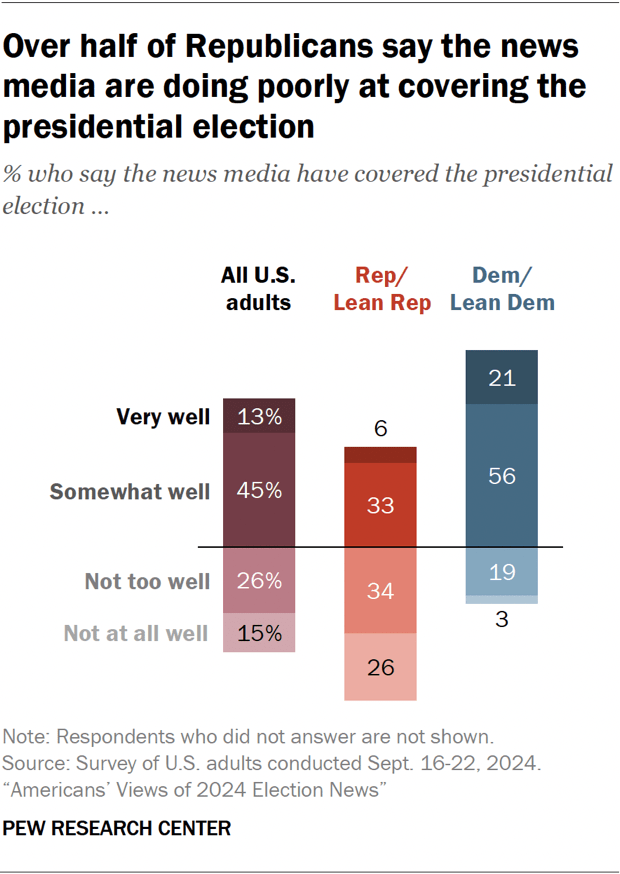
Overall, more than half of U.S. adults say the media have done very (13%) or somewhat (45%) well covering the election, similar to the share who said the same in 2020. But Democrats are about twice as likely as Republicans to hold this opinion (77% vs. 39%).
Within each party, these perceptions differ by age. While younger Democrats are less likely than older Democrats to give the media positive marks on their 2024 election coverage, the opposite is true among Republicans. Younger Republicans are somewhat more likely than their older GOP counterparts to say the media are doing at least somewhat well.
People across all political and age groups are more likely to say the news sources they turn to most often are doing well covering the election than to say the same about the news media in general.
Jump to more on how Americans feel about election news.




